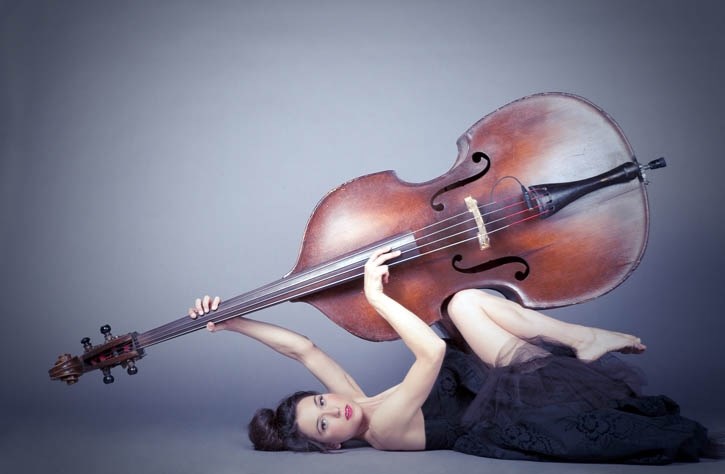Brandi Disterheft is a small woman with a big instrument.
Playing upright bass like it’s a lead instrument, she’ll bring her jazz band to Communitea Cafe in Canmore for a performance on Wednesday (Nov. 7).
Disterheft grew up in a musical family, with a mother who professionally plays jazz piano and organ and a father who plays trumpet.
“I first started playing piano and my dad suggested, ‘What about the upright bass?’ and I immediately took to it because it has this beautiful low, charming round sound and it’s such a unique role in the band, because you’re pumping out this beautiful groove – you’re like a rhythm instrument, except you have all the harmony with it.”
While Disterheft began playing piano at age five, she switched to upright bass at 13.
“At first I had a step stool that I had to use to play it,” she said. “I had to learn the bass quick, and I remember just crying, because my fingers were bleeding and blistering, and I couldn’t understand why this instrument was so painful. But once you’re on it for a couple of weeks, your fingers callous up.
“We just took a summer trip sailing and had four weeks off, and when I came back to the bass, sure enough, I had blisters again.”
While most bands of other genres – rock, folk, country – will relegate the bass to backing role, with Disterheft’s jazz music, the upright bass is front and centre.
“There’s so many virtuosic bass players, the bass has really been revolutionized. A lot of the songs I write feature the bass as a soloist and playing the melody,” she said. “I’m also a traditionalist and I like that romantic, old-school sound of jazz from the ’40s and ’50s and just playing the role of a bass player is very satisfying.”
Originally from Vancouver, she studied in Toronto. This will be her first time playing in Canmore.
“It’s a good stop along the way, and I hope people like jazz there,” she said. “It’s like a niche art form and it’s very vibrant in certain cities. Like in Vancouver, there’s a lot of smaller clubs where there’s jazz and people move to Vancouver to be part of that scene.
“In Toronto when I lived there, I was working every night, if not two gigs per day. There’s so much jazz, with little speak-easys that go until five in the morning, with people dancing to jazz.”
Disterheft now lives in New York City, the centre of the jazz world, she said.
“New York is the city where everyone from all over the world comes to play music,” she said. “It’s a great vibrant city and any given night you can hear world-class music and a lot of the jazz legends live here.”
With this tour she’ll play music from her newly-released third album, Gratitude.
“The album before was a crossover, with a lot of Brazilian music, and I wanted it to appeal to a young audience to get them into jazz,” she said. “With this album, I was thinking ‘What music do I really love and listen to on a constant basis when I’m at home?’ and it’s mainly ‘50s/’60s blue note albums. It’s very rejoiceful music – it sounds like a party, it makes you want to dance – and this is the type of album I wanted to produce.”
For this album, Disterheft hired some of the best musicians in the world, she said.
“Renee Rosnes, she’s been playing in New York for many years, I asked her to play on the album,” she said. “And one of my favourite drummers in the world, Greg Hutchinson, he’s like a machine, such a beautiful player played on it.
“He can play the tradition really well and he’s been playing with the legends all his life. And I asked three horn player friends also to be on the album. It was a real thrill.
“I wrote the song “Gratitude” for my cousin – he passed away suddenly last year. It was quite upsetting. So “Gratitude” is a sweet song dedicated to the celebration of his life and the memories that we have.”
The final song on the album, “Compared To What,” was a big hit many years ago by Roberta Flack, said Disterheft, with themes that still apply today.
“It’s quite a political song, it’s like a vignette of what’s happening today with all the political protests, and that still very much applies to today with consumerism and where people’s values are,” she explained. “It has a huge back beat and a real funky base line.
“And I’m also singing a song in French, basically a love song. I really enjoy singing in French because I have a different persona – you don’t have to be shameful of pouring your heart over these lyrics – because the English people don’t understand what I’m saying, I find it very freeing.”
With a lot of variety, Disterheft likes to style her live shows in the same way, and hopes there will also be people up out of their seats dancing during the show.
“I’m often criticized because my albums aren’t continuous, but I like to plan my shows that way too, because I think if you’re listening to the same thing for an hour, you get quite tired of it,” she said. “So I like to throw in curveballs – we’ll have a traditional song, then a very modern song, and perhaps a freeform song and then go back to a song with a big backbeat.”
Disterheft can be found online at www.brandidisterheft.com




